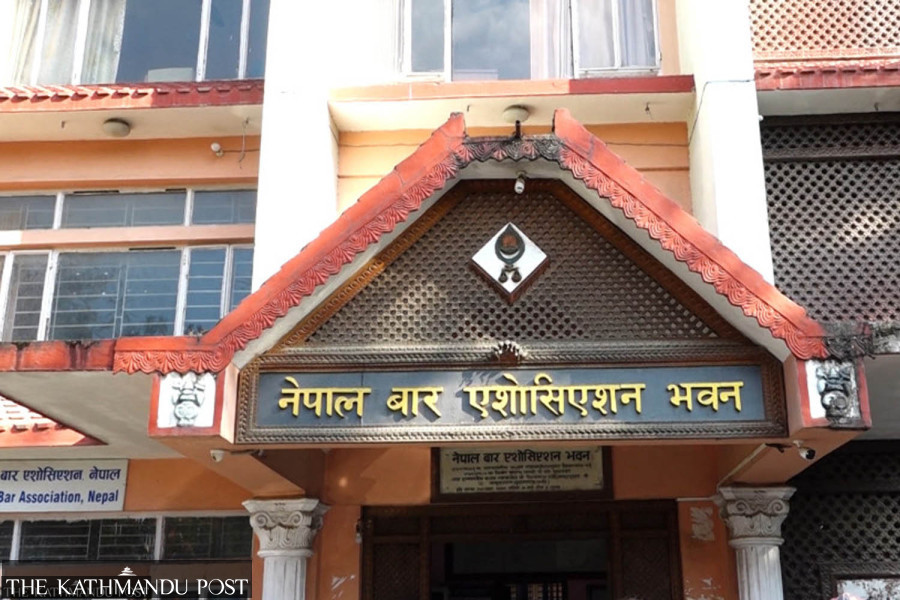National
Bar objection adds new hurdle to judges’ appointment
Lawyers resume protest after chief justice called a Judicial Council meeting for 1 pm on Wednesday to pick the judges.
Post Report
Judges’ appointment has hit another hurdle with the Nepal Bar Association warning of boycotting the process of appointing judges by ignoring its demands.
The umbrella body of lawyers resumed its protest on Wednesday after the chief justice called a Judicial Council meeting for 1 pm to pick the judges in the Supreme Court and high courts. The attempt was foiled following the sit-in by lawyers.
The association has been on regular protests after the council revised its regulations in September last year, adjusting the judges’ ranking. According to the amendment published in the Nepal Gazette on September 20, the chief registrar of the Supreme Court or the council secretary, if appointed a high court judge, would be ranked right after the chief judge of the high court.
The association has demanded the provision be revoked, describing it as regressive, biased, discriminatory, arbitrary, and unconstitutional and arguing that it contradicts the principles established by Supreme Court’s verdicts. It claims that the amended regulation unfairly demotes judges appointed from among lawyers, placing them below career judges in the hierarchy.
“We had to restart the sit-in as no attention has been paid to our demands,” Gopal Krishna Ghimire, president of the association, told the Post. “We will be compelled to boycott the judges appointed without addressing our demands.”
The association has decided to continue the protest on Thursday as well.
Following the lawyers’ protest, the judiciary's leadership constituted a five-member committee on September 2 to settle the matter through dialogue. Prakash Man Singh Raut, the senior-most justice of the Supreme Court, led the panel.
The panel, however, failed to find a meeting point. The Nepal Bar Association refuses to budge from its demand to revert the changes.
Ram Prasad Bhandari, a member of the council, Ghimire, Anjita Khanal, general secretary of the association, and Yam Bahadur Budha, secretary at the council, were members of the panel.
Despite 10 days of effort, the Raut-led panel couldn’t resolve the dispute. Raut and Bhandari disagreed with the association’s demand to revert the amendment, while Budha remained neutral. As a result, two separate reports were presented to Chief Justice Bishwombhar Shrestha.
Four justice positions have remained vacant in the Supreme Court for months. The chief justice and the justice Prakash Dhungana have stopped hearing the cases as a practice to remain on leave a month prior to their retirement. Six justices need to be appointed in the 21-member court. Similarly, different high courts have 16 vacant positions of judges.
As the chief justice retires on October 4, he wants to fill the vacant positions before that. However, there is a voice within the judiciary that he shouldn’t be involved in making long-term decisions on the verge of retirement.
The five-member Judicial Council, led by the chief justice, nominates judges and justices. The council includes the law minister, the senior-most Supreme Court justice, and two advocates—one each picked by the association and the government.
The council has already appointed the judges based on the regulation. In December last year, the council appointed Lal Bahadur Kunwar, the Supreme Court chief registrar, a high court judge and ranked him second after the chief judge of Patan High Court.
“Instead of making efforts to implement our recommendation by making it public, the council seems hell-bent on appointing the judges without any change in the regulation. It is insensitive,” said Ghimire.
Contrary to the association’s demand, the Judicial Officers Society, an association of the officials working under the judicial services, wants to continue the existing provision in the regulation. The society warned that any decision on legal matters must be made in court, not on the streets.




 10.12°C Kathmandu
10.12°C Kathmandu














